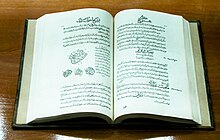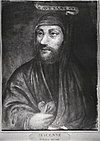
Back القانون في الطب Arabic Tibb qanunları Azerbaijani কানুন ফিততিব Bengali/Bangla Cànon de la Medicina Catalan قانوون لە پزیشکیدا CKB Kanon der Medizin German El canon de medicina Spanish قانون در طب Persian Lääketieteen kaanon Finnish Qanûn (Avicenne) French
 Persian version of The Canon of Medicine at Avicenna's mausoleum in Hamedan | |
| Author | Avicenna |
|---|---|
| Original title | القانون في الطب |
| Language | Arabic |
| Genre | Medical literature |
| Published | 1025 (Arabic) |
 |
| Part of a series on |
| Avicenna (Ibn Sīnā) |
|---|
| Works |
| Thoughts |
| Pupils |
| Monuments |
The Canon of Medicine (Arabic: القانون في الطب, romanized: al-Qānūn fī l-ṭibb; Persian: قانون در طب, romanized: Qānun dar Teb; Latin: Canon Medicinae) is an encyclopedia of medicine in five books compiled by Muslim Persian physician-philosopher Avicenna (ابن سینا, ibn Sina) and completed in 1025.[1] It is among the most influential works of its time.[2] It presents an overview of the contemporary medical knowledge of the Islamic world, which had been influenced by earlier traditions including Greco-Roman medicine (particularly Galen),[3] Persian medicine, Chinese medicine and Indian medicine. Its translation from Arabic to Latin in 12th century Toledo greatly influenced the development of medieval medicine. It became the standard textbook for teaching in European universities into the early modern period.[4]
The Canon of Medicine remained a medical authority for centuries. It set the standards for medicine in Medieval Europe and the Islamic world and was used as a standard medical textbook through the 18th century in Europe.[5][6] It is an important text in Unani medicine, a form of traditional medicine practiced in India.[7]
- ^ Finger, Stanley (2001). Origins of Neuroscience: A History of Explorations into Brain Function. Oxford University Press. p. 177. ISBN 978-0-19-514694-3.
- ^ Dols, Michael (1984). "Insanity in Byzantine and Islamic Medicine". Dumbarton Oaks Papers. 38: 135–148. doi:10.2307/1291501. JSTOR 1291501. Archived from the original on 9 November 2022. Retrieved 18 December 2021.
- ^ "Encyclopedia Iranica; Avicenna: Medicine and Biology". Archived from the original on 1 December 2019. Retrieved 20 December 2013.
- ^ Siraisi, Nancy G. (1987). Avicenna in Renaissance Italy: The Canon and Medical Teaching in Italian Universities after 1500. Princeton University Press. pp. 19–40. JSTOR j.ctt7zv225.
- ^ A.C. Brown, Jonathan (2014). Misquoting Muhammad: The Challenge and Choices of Interpreting the Prophet's Legacy. Oneworld Publications. p. 12. ISBN 978-1780744209.
- ^ McGinnis, Jon (2010). Avicenna. Oxford: Oxford University Press. p. 227. ISBN 978-0-19-533147-9.
- ^ Heller, M.; Edelstein, P.; Mayer, M. (2001). Traditional medicine in Asia (PDF). World Health Organization. p. 31. ISBN 9789290222248. Archived from the original (PDF) on 31 July 2020. Retrieved 24 April 2020.
© MMXXIII Rich X Search. We shall prevail. All rights reserved. Rich X Search